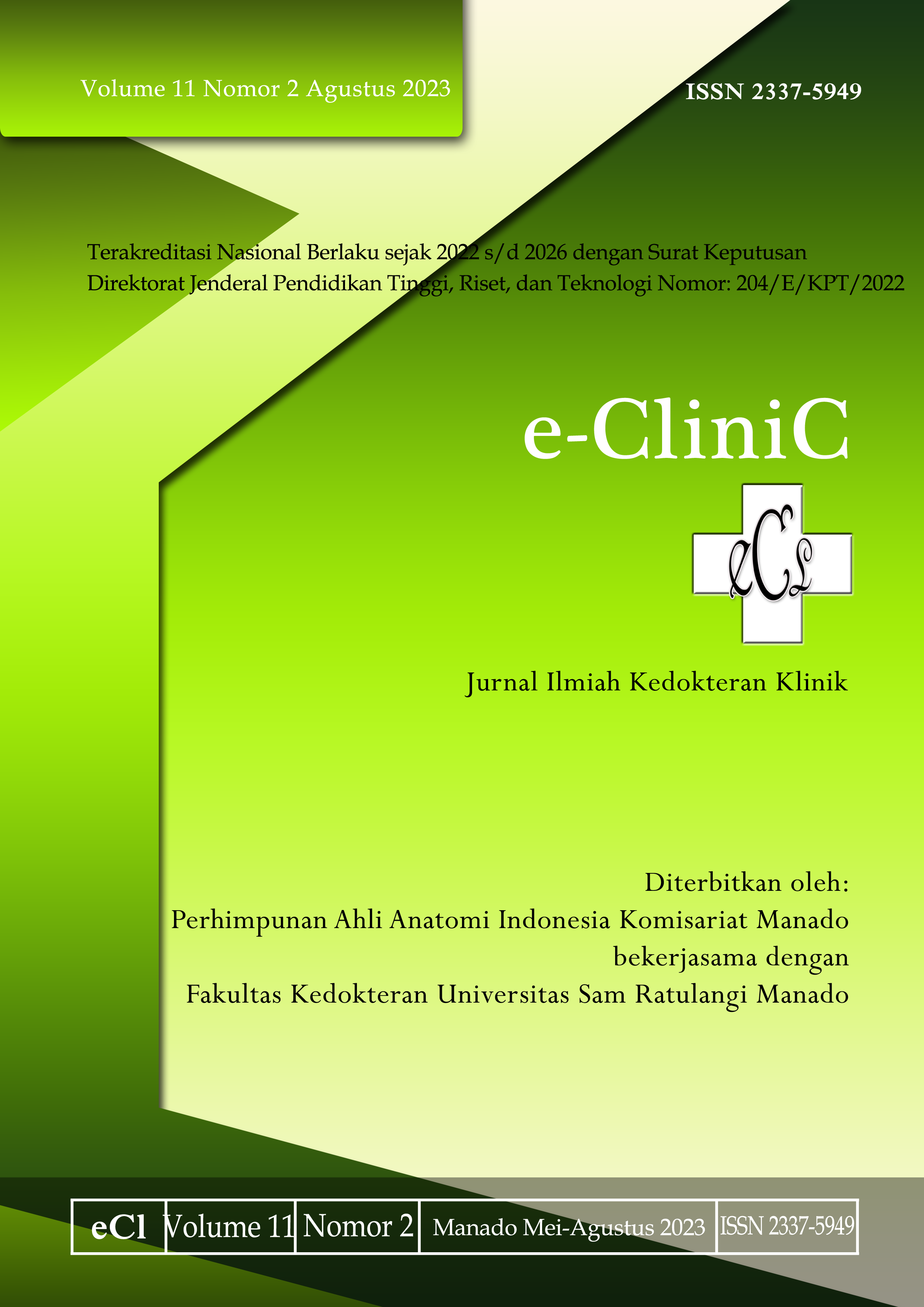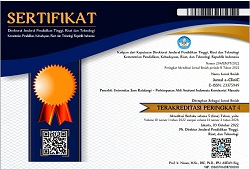Pemantauan Paska Transplantasi Ginjal
DOI:
https://doi.org/10.35790/ecl.v11i2.47631Abstract
Kidney transplant recipients require unique medical care that includes attention not only to the function of the transplant itself, but also to common medical problems that are more prevalent, more atypical, and more severe in presentation than in the general population. Due to the successes of kidney transplantation, the estimated additional life-years gained from renal transplantation vary from 8 to 31 years. During the early phase, prevention of acute rejection and infection are the priority. After around 3–6 months, the priorities change to preservation of transplant function and avoiding the long-term complications of immunosuppressive medication (the medication used to suppress the immune system to prevent rejection). The potential complications discussed include heart disease, infection, cancer, bone disease and blood disorders. There is also a section on contraception and reproductive issues. In conclusion, the most important management of post kidney transplantation is prevention of acute rejection and opportunistic infections. Prognosis of kidney transplant recipient will worsen if both of the conditions mentioned occur.
Keywords: kidney transplant recipients; post kidney transplantation; early phase prevention; long-term-complications
Abstrak: Resipien transplantasi ginjal memerlukan perawatan medis khusus yang memerlukan perhatian tidak hanya pada fungsi transplantasi itu sendiri, tetapi juga pada masalah medis umum yang sering timbul, atipikal, umumnya dengan presentasi yang lebih parah daripada populasi umum. Transplantasi ginjal yang berhasil dapat menambah usia harapan hidup yang bervariasi, berkisar delapan hingga 31 tahun. Selama fase awal prioritas penanganan ialah reaksi penolakan akut dan pencegahan infeksi. Setelah 3-6 bulan paska trasnplantasi, prioritas ialah mempertahankan fungsi transplantasi dan menghindari komplikasi jangka panjang dari pengobatan imunosupresif (obat yang digunakan untuk menekan sistem kekebalan, untuk mencegah reaksi penolakan). Potensi komplikasi yang dibahas meliputi penyakit jantung, infeksi, kanker, penyakit tulang, kelainan darah, kontrasepsi dan masalah reproduksi. Simpulan kajian ini ialah penatalaksanaan paska transplantasi ginjal yang paling penting berupa pencegahan penolakan akut dan infeksi oportunistik, dimana prognosis resipien transplantasi ginjal akan memburuk jika kedua kondisi tersebut terjadi.
Kata kunci: resipien transplantasi ginjal; pasca transplantasi ginjal; pencegahan tahap awal; komplikasi jangka panjang
References
Garcia G, Harden P, Chapman J for the World Kidney Day Steering Committee 2012. The Global Role of Kidney Transplantation. Kidney Blood Press Res. 2012;35:299–304. Doi 10.1159/000337044.
Ojo AO, Hanson JA, Meier-Kriesche HU, Okechukwu CN, Wolfe RA, Leichtman AB, et al. Survival in recipients of marginal cadaveric donor kidneys compared with other recipients and wait-listed transplant candidates. Journal of the American Society of Nephrology (JASN). 2001;12(3):589-97.
Ying T, Shi B, Kelly PJ, Pilmore H, Clayton PA, Chadban SJ. Death after kidney transplantation: an analysis by era and time post-transplant. J Am Soc Nephrol. 2020;31(12):2887-899. Doi: 10.1681/ASN.2020050566.
Hariharan S, McBride MA, Cherikh WS, Tolleris CB, Bresnahan BA, Johnson CP. Post-transplant renal function in the first year predicts long-term kidney transplant survival. Kidney Int. 2002 Jul;62(1):311-8. doi: 10.1046/j.1523-1755.2002.00424.x. PMID: 12081593.
Kasiske BL, Vazquez MA, Harmon WE, Brown RS, Danovitch GM, Gaston RS, et al. Recommendations for the outpatient surveillance of renal transplant recipients. J Am Soc Nephrol. 2000;11(Suppl 15): S1-86.
Expert Group on Renal Transplantation. European best practice guidelines (EBPG) for renal transplanta-tion. Section IV: Long-term management of the transplant recipient. Nephrol Dial Transplant. 2002;17(Suppl 4):1-67. PMID: 12484407.
Kidney Disease: Improving Global Outcomes (KDIGO) Transplant Work Group. KDIGO clinical practice guideline for the care of kidney transplant recipients. Am J Transplant 2009; 9(Suppl 3): S1–S157.
Kidney Disease: Improving Global Outcomes (KDIGO) Glomerular Diseases Work Group. KDIGO 2021 Clinical Practice Guideline for the Management of Glomerular Diseases. Kidney Int. 2021; 100(4S):S1-S276. Doi: 10.1016/j.kint.2021.05.021.
Atkins D, Best D, Briss PA, Eccles M, Falck-Ytter Y, Flottorp S, et al. Grading quality of evidence and strength of recommendations. BMJ. 2004;328(7454):1490. Doi: 10.1136/bmj.328.7454.1490.
Halloran PF. Immunosuppressive drugs for kidney transplantation. N Engl J Med. 2004;351:2715-29. Doi: 10.1056/NEJMra033540.
Kasiske BL, Anjum S, Shah R, Skogen J, Kandaswamy C, Danielson B, et al. Hypertension after kidney transplantation. Am J Kidney Dis. 2004;43(6):1071-81. Doi: 10.1053/j.ajkd.2004. 03.013. PMID: 15168388.
Uhlig K, Macleod A, Craig J, Lau J, Levey AS, Levin A, et al. Grading evidence and recommendations for clinical practice guidelines in nephrology. A position statement from Kidney Disease: Improving Global Outcomes (KDIGO). Kidney Int. 2006;70(12):2058-65. Doi: 10.1038/sj.ki. 5001875. Epub 2006 Sep 27. PMID: 17003817.
Karuthu S, Blumberg EA. Common infections in kidney transplant recipients. Clinical Journal of the American Society of Nephrology (CJASN). 2012;7(12):2058-70. Doi: 10.2215/CJN.04410512.
Nambiar P, Silibovsky R, Belden KA. Infection on kidney transplantation. In: Ramirez CGB, McCauley J, editors. Contemporary Kidney Transplantation. Springer International Publishing; 2017. p. 1-17. Available from: https://doi.org/10.1007/978-3-319-19617-6_22.
Agency for Healthcare Research and Quality. Methods Reference Guide for Effectiveness and Comparative Effectiveness Reviews, version 1.0 [Internet]. 2007 [cited 2023 January 4]. Available from: https://www.clinicaldevice.com/VintageGuidances/200710_AHRQ_Comparative_Effect iveness_Reviews_REQUEST.pdf
Guyatt GH, Oxman AD, Kunz R, Falck-Ytter Y, Vist GE, Liberati A, et al. GRADE Working Group. Going from evidence to recommendations. BMJ. 2008;336(7652):1049-51. Doi: 10.1136/bmj. 39493.646875.AE. Erratum in: BMJ. 2008;336(7658). Doi:10.1136/bmj.a402. PMID: 18467413; PMCID: PMC2376019.
Steddon S, Ashman N, Chesser A, Cunningham J. Oxford Handbook of Nephrology and Hypertension (2nd ed). Oxford: Oxford University Press; 2014.
Kidney Disease: Improving Global Outcomes (KDIGO) CKD–MBD Work Group. KDIGO clinical practice guideline for the diagnosis, evaluation, prevention, and treatment of chronic kidney disease–mineral and bone disorder (CKD–MBD). Kidney Int. 2009;76 (Suppl 113): S1–S130.
Downloads
Published
How to Cite
Issue
Section
License
Copyright (c) 2023 Yuswanto Setyawan

This work is licensed under a Creative Commons Attribution-NonCommercial 4.0 International License.
COPYRIGHT
Authors who publish with this journal agree to the following terms:
Authors hold their copyright and grant this journal the privilege of first publication, with the work simultaneously licensed under a Creative Commons Attribution License that permits others to impart the work with an acknowledgment of the work's origin and initial publication by this journal.
Authors can enter into separate or additional contractual arrangements for the non-exclusive distribution of the journal's published version of the work (for example, post it to an institutional repository or publish it in a book), with an acknowledgment of its underlying publication in this journal.
Authors are permitted and encouraged to post their work online (for example, in institutional repositories or on their website) as it can lead to productive exchanges, as well as earlier and greater citation of the published work (See The Effect of Open Access).







